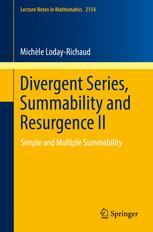

Most ebook files are in PDF format, so you can easily read them using various software such as Foxit Reader or directly on the Google Chrome browser.
Some ebook files are released by publishers in other formats such as .awz, .mobi, .epub, .fb2, etc. You may need to install specific software to read these formats on mobile/PC, such as Calibre.
Please read the tutorial at this link: https://ebookbell.com/faq
We offer FREE conversion to the popular formats you request; however, this may take some time. Therefore, right after payment, please email us, and we will try to provide the service as quickly as possible.
For some exceptional file formats or broken links (if any), please refrain from opening any disputes. Instead, email us first, and we will try to assist within a maximum of 6 hours.
EbookBell Team

4.8
44 reviewsAddressing the question how to “sum” a power series in one variable when it diverges, that is, how to attach to it analytic functions, the volume gives answers by presenting and comparing the various theories of k-summability and multisummability. These theories apply in particular to all solutions of ordinary differential equations.
The volume includes applications, examples and revisits, from a cohomological point of view, the group of tangent-to-identity germs of diffeomorphisms of C studied in volume 1. With a view to applying the theories to solutions of differential equations, a detailed survey of linear ordinary differential equations is provided, which includes Gevrey asymptotic expansions, Newton polygons, index theorems and Sibuya’s proof of the meromorphic classification theorem that characterizes the Stokes phenomenon for linear differential equations.
This volume is the second in a series of three, entitled Divergent Series, Summability and Resurgence. It is aimed at graduate students and researchers in mathematics and theoretical physics who are interested in divergent series, Although closely related to the other two volumes, it can be read independently.